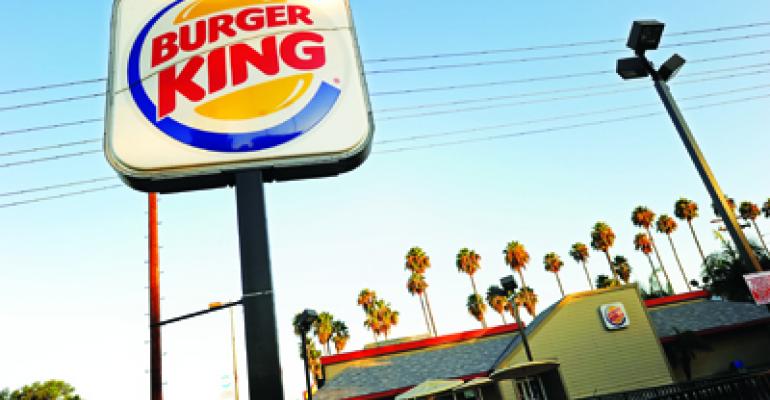The ink is not yet dry on Burger King’s plan to become a publicly traded restaurant company through a merger with shell company Justice Holdings, but one of its newest investors, hedge fund founder William Ackman, is already outlining plans to take on the burger segment’s No. 1 brand, McDonald’s.
To complete its turnaround after years of turbulent sales trends and a large going-private buyout in 2010, Burger King is planning to have nearly all restaurants franchised by the end of 2012, stress international unit growth and continue ongoing brand efforts including remodels, menu makeovers and marketing changes. All steps McDonald’s took when it began its upswing in 2004.
“McDonald’s is a great company. It’s one of the greatest stories of all time,” Ackman said in a conference call Wednesday. “But Burger King has become a very fast moving competitor. Burger King will do the same things, and do it much more rapidly.”
Ackman is a well known activist investor and the current chief executive of hedge fund Pershing Square Capital Management, which owns about 30 percent of Justice Holdings, which Ackman co-founded and took public in the United Kingdom in early 2011. Ackman had previously invested in — and publicly worked to take over or change management efforts at — Wendy’s and McDonald’s.
Late Tuesday, Burger King announced that it had struck a deal with Justice Holdings, which agreed to buy a 29-percent stake in the burger chain for $1.4 billion. Current BK owner 3G Capital will retain a 71-percent stake under the deal and continue to carry out its ongoing brand turnaround plan. Once merged, Justice will stop trading overseas and begin to trade on the New York Stock Exchange under Burger King Worldwide Inc.
Refranchising plans go into overdrive
Key in the chain’s turnaround is a plan to become an almost all franchised company, Ackman said.
Burger King is already 92-percent franchised, but the goal is to refranchise all but about 100 existing corporate locations around the Miami-based headquarters by the end of this year. The Burger King system includes 12,500 units globally, including 7,200 in the United States.
The company last month agreed to sell about 278 locations to its largest franchisee, Carrols Restaurant Group, which in turn has agreed to remodel 450 locations, accelerating the chain’s ongoing remodel plan.
Ackman said franchisees tend to be much better operators than corporations – which he noted has been true for McDonald’s.
“I believe a meaningful percentage of McDonald’s same-store sales growth since 2006 has been driven by the process of putting [restaurants] in the hands of franchisees,” he said.
Ackman pointed to a number of other quick-service brands that have achieved high valuations as almost all franchised companies, including Tim Hortons, Dunkin’ Donuts, Domino’s and Subway.
Heading overseas
International growth also will be key for Burger King, which has seen better results from its restaurants overseas.
“That’s probably the most exciting part of the story,” Ackman said. “In some ways, it’s a more successful brand overseas.”
Burger King is currently operating in 80 countries with 5,300 units overseas, but Ackman said some markets have been barely penetrated.
Ackman said the company will likely do more deals like the recent joint venture with franchise partners in Brazil, in which Burger King will take a minority stake in the franchise operator.
Continued from page 1
Brand turnaround efforts continue
In North America, where same-store sales turned positive in December and have stayed positive through March, Ackman said the chain will push re-imaging more aggressively than McDonald’s did.
McDonald’s has about 30 percent of its stores remodeled, which has been a huge factor in rising same-store sales for that brand, he noted.
“Burger King will do the same thing, but they don’t have the patience of McDonald’s and they will get it done much more rapidly,” he said.
Under the new ownership, remodel costs have been cut from about $500,000 to roughly $250,000, and the company is offering financing to help franchisees get the work done quickly. The goal is to have 40 percent of Burger King units remodeled with the new look within three years.
Over the past year, 3G Capital has also made significant changes to operations, Ackman said.
Under the previous owner, for example, field managers represented about 90 restaurants. Under 3G, almost all field managers were replaced and now each one is responsible for about 40 locations, which allows them to better support the restaurants, Ackman noted.
Compensation has also been linked to store performance, and field managers have been empowered to shut down locations that don’t meet standards.
“Nothing gets a franchisee’s attention like shutting down a restaurant,” Ackman said.
Still, Ackman said 3G Capital has also been successful in improving relations with franchisees, which were tense under previous management teams.
Steve Wiborg, executive vice president of Burger King Corp. and president of the North America division, has worked to resolve lawsuits filed by franchisees as well as involving franchisees fully in menu and marketing changes.
Some franchisees that spoke with Nation’s Restaurant News agreed, saying 3G Capital has made a point of focusing on franchisee profitability.
“They clearly brought the franchisees into the decision making process,” said Joel Aaseby, chief financial officer of Heartland Foods, a 297-unit franchisee in Downers Grove, Ill. “I think they know that if the franchisees aren’t successful, by definition they won’t be.”
Aaseby said expectations are high that the menu upgrades and remodels will improve results. His company’s locations in the U.S. and Canada were rolling out the new menu changes and just starting to see the benefit of the marketing push behind them.
The “non-scientific” feedback so far has been very positive, he said. “Folks that try our new product offerings really like them.”
Aaesby said he was not surprised to hear that Burger King is set to become a public company again — a move most franchisees expected, but perhaps not this soon.
Contact Lisa Jennings at [email protected].
Follow her on Twitter: @livetodineout




